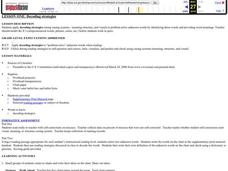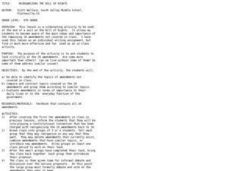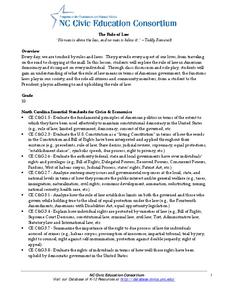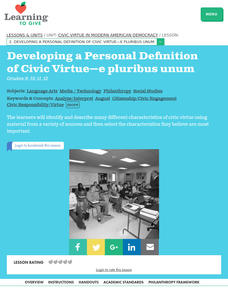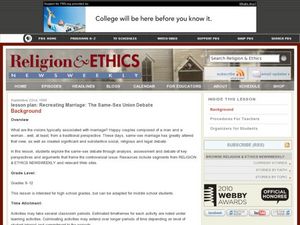Curated OER
Thomas Jefferson on the Sedition Act
Students research and cite arguments Jefferson used in objecting to the Sedition Act. They discuss Jefferson's opinion on how constitutional questions about the Sedition Act could be resolved.
National Endowment for the Humanities
Lesson 2: The Debate in Congress on the Sedition Act
Pupils research and discuss the provisions in the Constitution that supported the arguments for and against the Sedition Act. They articulate objections to and arguments in favor of the Sedition Act.
Curated OER
Black Kentuckians and the Civil War
Students demonstrate how the American Civil War affected black Kentuckians socially and politically. They identify and discuss the 13th Amendment to the U.S. Constitution, which forced the end of slavery in Kentucky months after the...
Curated OER
George Washington: First in War, First in Peace, and First in the Hearts of His Countrymen
Students interpret historical evidence presented in primary and secondary resources. In this George Washington lesson, students research the details of Washington's military successes, his role at the Constitutional Convention, and his...
Curated OER
Decoding Strategies
Young readers apply decoding strategies to identify unknown words. For this reading lesson, they read the Preamble and practice using decoding strategies. Small groups rotate to five charts that have questions regarding the Constitution...
Curated OER
Nevada Challenge
For this state facts worksheet, students read the statements about the state of Nevada. Students select the best answer to complete the 10 statements.
Curated OER
Reorganizing the Bill of Rights
Eighth graders look critically at the 26 amendments to the United States Constitution.
Curated OER
State Symbols
Third graders examine the symbolism of the United States by observing different flags. In this U.S. History lesson plan, 3rd graders utilize the Internet to research state seals, flags, and other symbols that represent specific...
Curated OER
History of the Bill of Rights
Students study the history of the Bill of Rights. In this Bill of Rights lesson plan, students read and use two handouts to learn about the history of the Bill of Rights. Students then work in groups to study the Bill of Rights. Students...
Curated OER
We Have Rights
Students investigate the concept of having rights as citizens. In this citizenship lesson, students examine the rights that are given to citizens of the United States in the Bill of Rights. They draw pictures of eight of their...
Curated OER
Rights and Responsibility
Students identify the shortcomings of the Articles of Confederation and explain how these shortcomings lead to the creation of the Constitution. They explain why the Bill of Rights was added to the constitution and identify six freedoms...
Curated OER
Explicit and Implicit Language - Interpreting the Meaning of the Fourteenth Amendment
Students write an essay analyzing the language of the Fourteenth Amendment to the US Constitution. In this US History lesson plan, students review the difference between implicit and explicit meanings. Students watch a video...
Curated OER
Lesson Two: The Federalist Papers
Students identify Articles of Confederation and explain why it failed, explain argument over need for Bill of Rights in Constitution and James Madison's role in securing it's adoption, and compare and contrast ideas of Federalists and...
Curated OER
European Union: Myths and facts
Learners examine the difference between myths and facts presented about the European Union. They read and discuss articles about the EU and its role in European politics by evaluating a referendum to the EU constitution.
Heritage Foundation
Congress's Economic Powers
Join Congress as they assess their economic abilities for spending—and as they discover their limits. High schoolers use an educational resource to explore Congress's economic powers and learn to apply these concepts to their everyday...
C-SPAN
Judicial Review and Marbury v Madison
The Supreme Court case Marbury v. Madison may not be widely recognized but the landmark case is particularly significant because it established the precedent for judicial review and that the Supreme Court had power as an interpreter of...
PBS
Ken Burns: Jackie Robinson - A Journey Back to Separate but Equal Conditions
Baseball great Jackie Robinson fought for social justice. His efforts to push for equal access are detailed in an episode from from the Ken Burns: The Jackie Robinson Collection. After viewing the clip, class members engage in a...
Judicial Learning Center
Do You Know Your Bill of Rights?
The Bill of Rights is much more than an important piece of paper! The rights cover everything from freedom of speech to the right to remain silent if arrested. Scholars find out their own rights by answering the questions in the form of...
Carolina K-12
The Rule of Law
What functions do laws serve in our society? Your learners will be guided through several interactive activities to address this question, and to consider the impact of rule of law in American society.
Curated OER
First Things First: Using the Newspaper to Teach the Freedoms of the First Amendment
Students use the newspaper as a tool to make connections about what the five freedoms guarantee in the First Amendment. For this first amendment lesson plan, students analyze events in the newspaper to form conclusions about the freedoms...
Curated OER
Civic Virtue in Democracy
Students identify and describe characteristics of civic virtue. Following a class discussion, they create their own definitions of civic virtue. They write essays based on their own definitions and formulate conclusions on the state of...
Curated OER
Racism, Discrimination, and the Law
Seventh graders examine the various racism and discrimination faced by various ethnic groups in the United States. In groups, they research the legal system and describe the purpose of the United States Constitution. They review cases...
Curated OER
The Federalist Papers
Students identify the Articles of Confederation and explain why it failed. They explain the argument over the need for a bill of rights in the Constitution and James Madison's role in securing its adoption by first Congress. Finally,...
Curated OER
Recreating Marriage: The Same-Sex Union Debate
A debate continues regarding same-sex marriage as a constitutional right. This lesson requires learners to define marriage then formulate an argument that reconstructs the national debate perspectives. Many standards are addressed but a...
Other popular searches
- United States Constitution
- United Statesusus Constitution
- The United States Constitution
- Unites States Constitution






